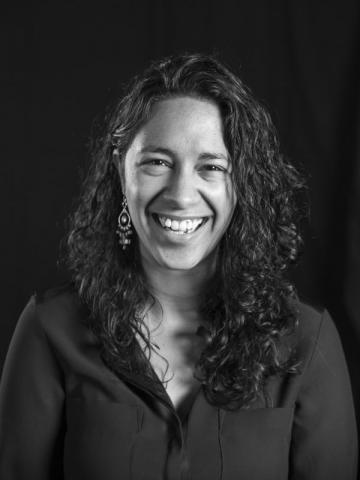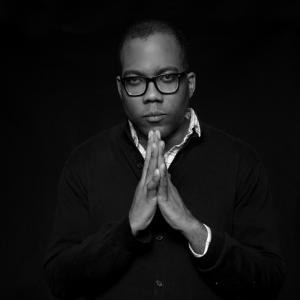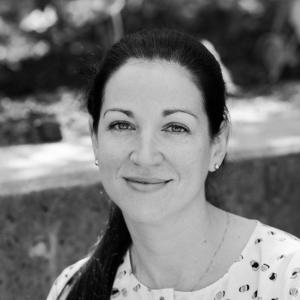
Lani Prunés was born and raised in Philadelphia and is an editorial assistant with Sojourners magazine. She enjoys the newly inspired art of writing her prayers before reading them, so devotions can be a physical embodiment. She loves the sound of the train and the alluring scents of tea and old books. The sound a new book makes as the spine cracks is incredibly edifying to her and anyone who calls themselves her friends.
Lani’s first church experience involved wooden pews that creaked and groaned when her fellow Pentecostals rose to sway and sing in Spanish. Now, church is more like a four-part harmony or babies laughing during a sermon.
Lani graduated from Eastern Mennonite University with a degree in English literature and writing studies, while minoring in journalism and communications. She co-edited EMU’s literary magazine, The Phoenix, and served as staff on the student paper for all four years in one capacity or another. When studying abroad in Guatemala and Colombia, Lani studied disputes over displacement and land titles, and the sadly familiar ache of urban violence, which pushed her to make a difference using the only weapon she could wield in good Mennonite consciousness: words.
Posts By This Author
An Inheritance of Scars
“WHAT YOU do to children matters. And they may never forget.”
This thread runs aggressively through Toni Morrison’s most recent novel, God Help the Child. The speaker is Sweetness, a woman who shares her family’s wounds from trying to pass for white, or “high-yellow,” for generations. Of trying to blend in well enough to drink at fountains, to try on hats in stores, to use the same Bible as whites during ceremonies. When her child and the novel’s focus, Bride, is born black, “midnight black, Sudanese black ... blue-black,” all the advancement Sweetness and her ancestors strove for dies. She loses her husband (who assumes she has been unfaithful), her social standing as a light-skinned woman, and any love for her child. “Her color is a cross she will always carry,” Sweetness says. “But it’s not my fault. It’s not my fault. It’s not my fault. It’s not.”
Bride grows up without the love of a mother’s touch and scorned for being so oddly dark, until she learns to use her color to make herself exotic and marketable. What may seem to be a character living into her identity as a black woman is really a façade in order to regain what was lost because of her skin. Of course, what Bride sees as progress is actually proof that she too has fallen into Sweetness’ obsession with what Morrison described in a recent NPR interview as “skin privilege—the ranking of color in terms of its closeness to white people or white-skinned people and its devaluation according to how dark one is and the impact that has on people who are dedicated to the privileges of certain levels of skin color.” But while race and color as social constructs are themes in the book, they are not explored as deeply or given as much emphasis as childhood trauma.
As in some of Morrison’s other novels, magical realism conveys the battle between the past and the present, the spiritual and the physical, playing a poignant, visceral part in Bride’s journey. Bride goes through a literal metamorphosis, assuming it is penance for gruesome choices she made as a child to feel alive and as an adult to feel powerful. She is numbed to what true progress and success are, constantly trying to put a fragmented identity together until she can no longer get up and must face her trauma and changing body.
The only people in the novel who allow themselves to truly heal are a child named Rain and an ex-convict named Sofia. They speak to the power of self-forgiveness. Too often we carry the shame and hate handed to us by other people’s evil, whether from childhood trauma and abuse or complacency and apathy as adults. While we can and must be held accountable for our own mistakes, we must also be willing to take off the shroud of self-loathing and guilt, and move forward past trauma into self-acceptance and healing. Both Rain and Sofia, young and old, can see the power of blame and regret and refuse to walk that path, while Bride, her lover Booker, and her mother Sweetness will arguably always drag the sins of their forebears behind them.
“What you do to children matters. And they may never forget.”
Short Takes: Jimmie Briggs
Bio: Jimmie Briggs is an award-winning journalist and author of Innocents Lost, a book giving voice to child soldiers. In 2009, he co-founded the Man Up Campaign, a global effort to engage youth to stop violence against women and girls, and currently serves as executive director of the U.S. branch of Leave Out Violence (LOVE).
1. Let’s talk about LOVE. What issues does your organization address? LOVE’s focus is to engage young people who have been affected by violence of all kinds. This includes not only gender-based violence, but also issues such as gun violence, witnesses of domestic violence, and trauma- processing in schools where violence is the reality. LOVE uses media arts coupled with a trauma-informed response. We have a social worker for one-on-one counseling, and our teaching artists use media arts to provide pathways for young people who have been affected by violence—survivors and witnesses, even perpetrators—to express their voice and ultimately to process their pain, their trauma, and sometimes their guilt from the violence.
At the same time, LOVE creates a stage for them to speak about their experiences and advocate among their peers about conflict resolution and violence prevention. The arts offer a way to heal and process the violence you’ve experienced, but also for you to reach your peers and mitigate violence from happening in your schools, your home, and in your communities.
Finding Healing Through Theater
Kranti is Hindi for "revolution." Indeed, this extraordinary organization is working to erase the heavy labels that come with being born, raised, and even trafficked in Kamathipura. Laal Batti Express ("Red Light Express") is a three-segment depiction of the girl’s delightful and dark stories, of which each performer was asked to add three.
"We call the girls revolutionaries," Robin said.
Mass Incarceration: The Politics Behind the Bars
An infographic illustrating mass incarceration
'New Girl' and the Constant Negotiation of Race
For being a television show based on absurdist humor and millennial first-world-problems, New Girl hit home earlier this month.
Winston, played by Lamorne Morris, is a roommate with a thousand changes in career, the latest and most lasting being that of a cop for the Los Angeles Police Department. The hilarity surrounding Winston has mostly been about his police training or his friend’s concern for his safety, when they tried to physically keep him from policing by stealing his cruiser keys. Then, with script writing help from Morris himself, New Girl took a momentarily serious turn.
When a pretty woman invites Winston on a date to the park for a rally to protest the police, who she describes arrested a 14-year-old because he “fit a description,” Winston declines, walking backward to hide his LAPD shirt.
He later says, “With everything that’s been going on, I just feel like she wouldn’t respect me.”
In that moment, Morris’ character finds himself caught between two conflicting worlds, what W.E.B. Du Bois called having a “double consciousness” — the brotherhood of a police force alongside white officers, keeping the peace and making neighborhoods safer; and the collective turmoil that comes with being a black man in a post-Ferguson America.
Many Americans must feel this conflicting pull and feel unable to voice it: citizens with friends or family who are officers and who are in solidarity with their black and brown neighbors; officers themselves who fear for their safety every moment they are on duty and battle with racial implicit bias because of harrowing experiences in their communities.
I myself feel this pull as a woman of color who grew up in North Philadelphia, where a mistrust of police was built into my framework of survival despite never once having a negative experience with Philly police. Solidarity with Eric Garner, John Crawford, and Dante Parker is a given. They are the kind of men I saw everyday growing up, men with questionable pasts and an unquestionable love for their families and communities — despite only the former being brought to light.
And I have met police officers working in neighborhoods where they and their partners are cornered and ambushed by street gangs; men and women with families, who are told they are hated by the black and brown children they rescue from crime scenes.
I turned to music as I wrote myself in circles, trying here to verbalize an emotion, a worried feeling that I’m not doing something right. I came across a radio interview with Community star and rapper Donald Glover in which he talks about what I believe Morris was battling with his New Girl script.
“Being young and black in America is schizophrenic. You kind of have to change who you are a little bit all the time for people to even respect you.”
Mapping the Reach of Canadian Mining
An interactive map showing Canadian mining locations
INFOGRAPHIC: The New Indentured Servitude
While President Obama's "Student Aid Bill of Rights" is a prudent and necessary step towards aiding college students, his announcement comes late for the seven million borrowers already indentured to their education debt. In "Forgive Us Our Debts" (Sojourners, April 2015), Virginia Gilbert investigates the cause-and-effect battle of education debt and the way it is hindering a generation of college students. How big is the student debt burden? See below for the poor report card reveal.
Short Takes: Anastasia Uglova
1. How would you describe Akilah Institute’s goals for its students and alumnae? Rwanda today is a far cry from the genocide-torn country that most think of when they hear about it. Rwandans have a vision of a knowledge-based economy, and Rwanda is fast becoming the region’s leader in information technology and new business development. And yet, only 1 percent of Rwandans attend university, and just 30 percent of these are women. We want to make sure that young women have a part to play in building the country’s future.
Akilah’s unique model of market-relevant education empowers young women to launch professional careers and assume leadership roles when they graduate. During their three years at Akilah, students develop English fluency, leadership, public speaking, and critical-thinking skills.
Why We Need More 'Safe Harbor Laws'
When a San Antonio couple was caught trafficking a 16-year-old online, their excuse was that they had no prior knowledge of her age and “were trying to help her.” Meanwhile, Jeffrey Charwick Wright, a now ex- Navy sailor, trafficked an HIV-positive 17-year old in Virginia, Maryland, and North Carolina for his own good. But hey, at least he could admit it.
These horrible anecdotes are popping up all over the U.S., with underage children—both Americans and immigrants—trafficked for labor, and more often, for sexual exploitation. The most surprising issue, however, is the conversation on whether those who are trafficked are criminals themselves. Sadly, in 19 states and all of the American territories, that is the case.
The good news is that a majority of states have some form of "safe harbor laws," laws that prevent underage victims of trafficking from facing criminal charges and from being treated as culpable and willing participants.
Invest in Women, Divest from Trafficking
Human trafficking is an overwhelming and complicated issue.
(Actually the root causes of human trafficking are complex. But there’s nothing complicated about treating people like people, not property).
Yet, how can those with little time to volunteer or a burgeoning desire to make some kind of difference do so?
Support socially responsible businesses! Here are five groups dedicated to helping sell the products of at-risk women and girls, as well as trafficking survivors—supplying them with work and the means to provide for their families.
Engage in smarter buying—invest in women, in their work, and in their futures.
AUDIO: Margaret Atwood Reading from "Year of the Flood."
A Sojourners exclusive audio reading from "Year of the Flood"
Four Questions for Beth Katz
Beth Latz is founder and executive director of Project Interfaith, projectinterfaith.org
1. Why did you decide to launch Project Interfaith?
There are a couple experiences in my life that led me to found PI. One would be that my grandparents immigrated to this country after experiencing harsh persecution as a result of their Jewish identity. Another would be growing up as a religious and ethnic minority and encountering a lot of people making assumptions about what that means. I didn’t always feel welcome or free to be who I am. But growing up and hearing about my grandparents’ experiences in other countries, I realized how lucky we are to have certain rights in this country. So I wanted to make sure people understand these rights and freedoms.
INFOGRAPHIC: Guns in America
In Dawn Cherie Araujo’s article, “Grace-Filled Moments” (Sojourners, January 2015), she explores the rising gun violence in Indianapolis and the ways local churches have taken stands to support families and rise up against the prevalence of grief in their communities.
What are groups like the Church Federation of Greater Indianapolis facing as they combat gun trafficking and violence? Check out the interactive infographic below and learn about the United States’ tumultuous relationship with guns. What are your state’s gun laws?
TIMELINE: Incarnation
Vincent Gordon Harding and Rosemarie Freeney Harding: A Biographical Timeline
STORY MAP: The Great Divide
A map depicting the lives lost at the hands of police brutality
INFOGRAPHIC: The Voter Suppression Guide
An infographic on voter suppression







